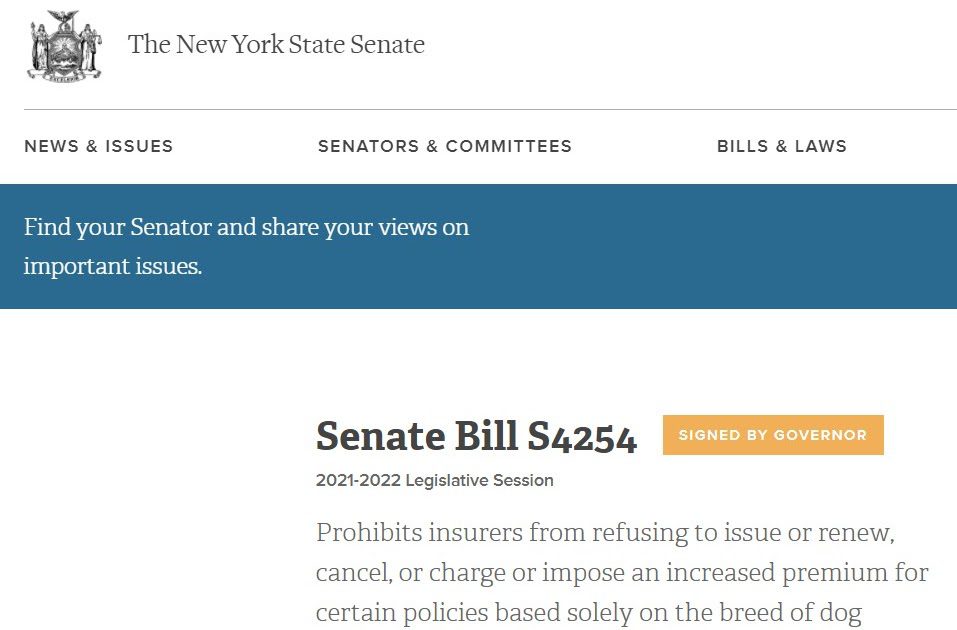Refusing to Issue or Renew, or Cancelling or Charging More for a Homeowners Insurance Policy Based on Certain Dog Breeds Will Be Illegal in New York State Come January 28, 2022

On October 30, 2021, New York Governor Kathy Hochul signed into law bill S4254/A4075, which prohibits insurers from refusing to issue or renew, cancel, or charge or impose an increased premium for homeowners’ insurance policies based on the breed of a dog owned. This bill prohibits the use of dog breed in relation to underwriting and rating in homeowners’ insurance policies as defined by New York Insurance Law §2351.
The bill adds new section 3421 to the New York Insurance Law:
§ 3421. Homeowners’ liability insurance; dogs.
1. With respect to homeowners’ insurance policies as defined in section two thousand three hundred fifty-one of this chapter, no insurer shall refuse to issue or renew, cancel, or charge or impose an increased premium or rate for such policy or contract based solely upon harboring or owning any dog of a specific breed or mixture of breeds.
2. The provisions of this section shall not prohibit an insurer from refusing to issue or renew or from canceling any such contract or policy, nor from imposing a reasonably increased premium or rate for such a policy or contract based upon the designation of a dog of any breed or mixture of breeds as a dangerous dog pursuant to section one hundred twenty-three of the agriculture and markets law, based on sound underwriting and actuarial principles reasonably related to actual or anticipated loss experience subject to the applicable provisions of section three thousand four hundred twenty-five of this article.
We know that the new law will take effect on January 28, 2022.
What we don’t know (yet) is what impact, if any, the new law will have on insurers’ use of canine or dog-breed exclusions in New York come January 28, 2022. The new law mentions only underwriting functions, not claims–making it illegal to refuse to issue or renew a policy, or to cancel or charge more premium for a policy based on a policyholder’s or prospective policyholder’s “harboring or owning any dog of a specific breed or mixture of breeds.” There’s nothing in the new statute expressly prohibiting insurers from including a canine exclusion in a New York homeowners policy or in denying coverage based on such an exclusion. Many insurers writing homeowners policies in New York already use such exclusions, filed and approved by New York’s insurance regulator. Question is: how will those insurers now ask and learn about those dogs without appearing to run afoul of the new law?
Can the Senate bill version’s “Justification” section be read to suggest that the aim of the legislation may have been at prohibiting coverage denials based on dog breed?
For years, insurance companies that offer homeowners insurance have
avoided loss because of the burglary prevention provided by homeowners’
dogs. It is unacceptable that now insurance companies would want the
ability to deny coverage based on the exact same breed of dog that may
have protected the homeowners and the insurance company from loss.
This bill would uphold the sanctity of the law by ending the discrimination of homeowners based on the breed of dog that they own. As an
equal and fair society, it is key that we amend the insurance law to
protect the interests of both homeowners and their kind-hearted companion animals.
Give me a break. Who wrote that? The sponsoring senator’s 12-year-old niece or nephew?
Critique aside, was the “ability to deny coverage” comment meant to refer to the underwriting stage? Or the claim stage? The language of the new Insurance Law section suggests that that dart was aimed at underwriters, not claim handlers. Agree?
Please comment if you have any bright or even not-so-bright ideas.







